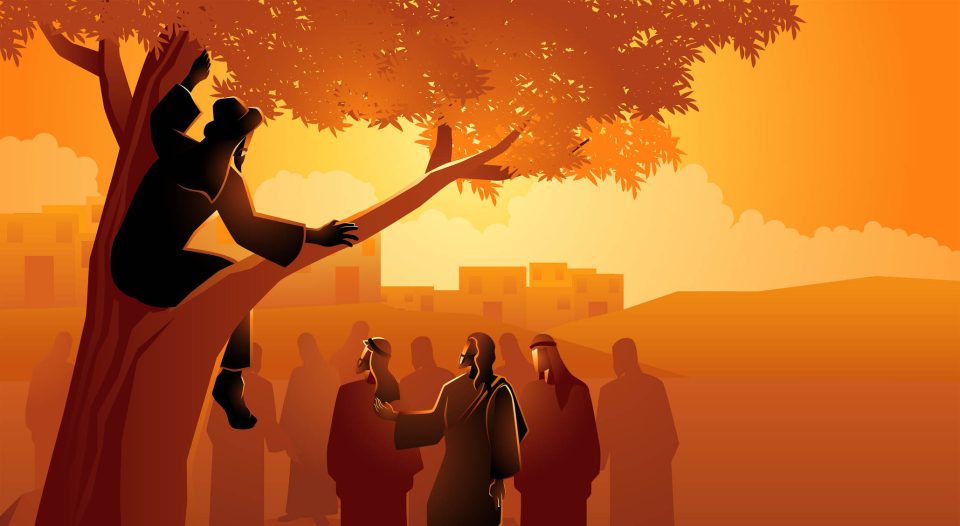Lectionary for Oct 30, 2022
21st Sunday after Pentecost
Isaiah 1:10-18; Psalm 32:1-7;
2 Thessalonians 1:1-4, 11-12; Luke 19:1-10
I feel like Zacchaeus might be one of the most misunderstood people in the Bible, and that is saying a lot! Who was this tax collector who encountered Jesus in Jericho? While he is mostly known for being short, what more does Scripture teach us about this man? And why “must” Jesus stay with him? Finally, how does really hearing Zaccheus’ words teach us about the ways of God? Let me make a case for understanding Zaccheus as one of the most righteous people whom Jesus encounters in his earthly ministry.
We are introduced to Zacchaeus as a “chief tax collector who was rich.” He collaborated with the empire to transfer wealth from the people to those already in power. Zacchaeus was probably already wealthy when he was selected to be a chief tax collector. Frequently people of prominence in a community were forced into positions of responsibility for ensuring that the occupying Romans received taxes, whether they wanted that responsibility or not. Presumably the money raised by other tax collectors flowed through Zacchaeus to the Romans to fund their occupation of the Holy Land. It would be natural for anyone who wasn’t a Roman to hate Zacchaeus and see him as an arch-sinner, which seems to have been the case (Luke 19:7).
I’m not going to spend much time talking about the tree that Zacchaeus climbed. I know this is everyone’s favorite part. But it’s more important to ask why he climbed the tree. It may be merely because he was short and couldn’t see over the crowd. But why not simply squeeze past people and stand in front to see Jesus? I argue that Zacchaeus dared not touch the crowd since he was perpetually ritually impure due to his ongoing contact with Roman idolatrous coinage. The Mishnah, and then later the Talmud, say that Jews who collected taxes for the Romans were to be regarded as a thief (M. Tohorot 7:6; BT Chagigah 25a). I believe the tree was the only safe place for Zacchaeus in the crowd of people wanting to see Jesus.
But Jesus didn’t call Zacchaeus, himself or any one of us to safety. Instead, he calls us to relationship. When Jesus told Zaccheus to climb down so he could lodge with him, the people immediately complained. Zacchaeus heard their complaint, stopped in his tracks and made his case to the only person who would listen: “Behold, Lord, I’m giving half of my possessions to the poor, and if I have extorted anyone, I’m paying him back fourfold” (8).
Note that we have Zacchaeus’ speech reported in present active indicative, not any future tense. He wasn’t telling Jesus what he would do on account of their encounter. Instead, he described his present practice of giving away half of his wealth. Further, Zacchaeus scrupulously examined the wealth that came into his hands, and if it was done through extortion (“sykophanteo” is one of my favorite Greek verbs), he already gave back four times as much as was taken.
I believe the tree was the only safe place for Zacchaeus in the crowd of people wanting to see Jesus.
Zacchaeus was ostracized by the religious community because of a position that he was probably forced into as a person of prominence. He was shunned and excised from communal life. Jesus reached out to him to say that the great rabbi whom everyone assembled to see would be lodging with him. People weren’t exactly beating down Zacchaeus’ door to enjoy his hospitality. When the crowd murmured against Jesus, Zacchaeus took the opportunity to explain to him, but I think even more so to his neighbors, that he wasn’t getting rich from tax collecting. Instead, he was giving away at least half of his wealth to the poor. Couldn’t people see that Zacchaeus was a good man forced into a bad position? He probably supported the Roman occupation no more than Simon of Cyrene, who was forced to carry Jesus’ cross.
Jesus recognized Zacchaeus’ deep hurt at his expulsion from the community. He proclaimed that salvation had come to this house because Zacchaeus, too, was a son of Abraham. Jesus came to seek and save the lost, and Zaccheus was certainly lost to the community. In Jericho, Jesus’ act of healing wasn’t exorcising evil spirits or healing injured bodies. Instead, Jesus accepted hospitality from someone the community had shunned because of the ways he was forced to collaborate with injustice and the empire.
Jesus doesn’t just hang out with the people we like or approve of—he comes to save all the lost. May we never chase Zacchaeus up a tree. Instead, may we be more like him in opening our hands and homes to the poor and the wandering.





